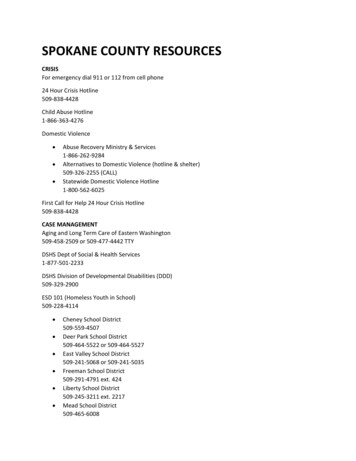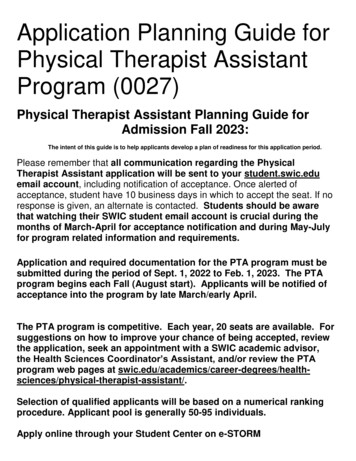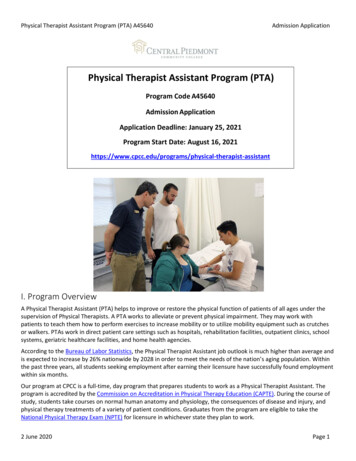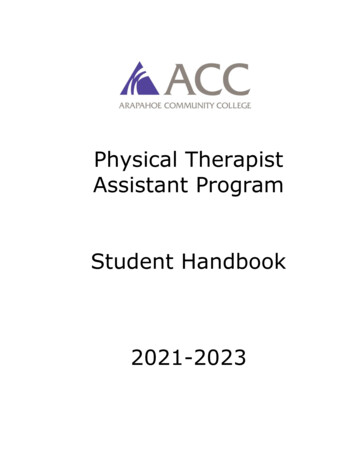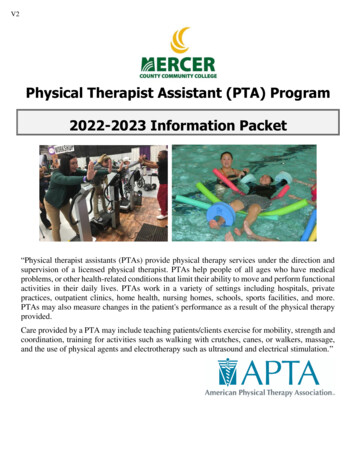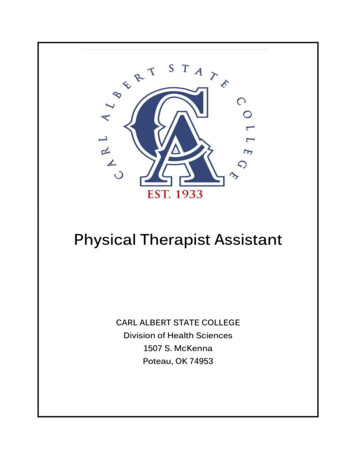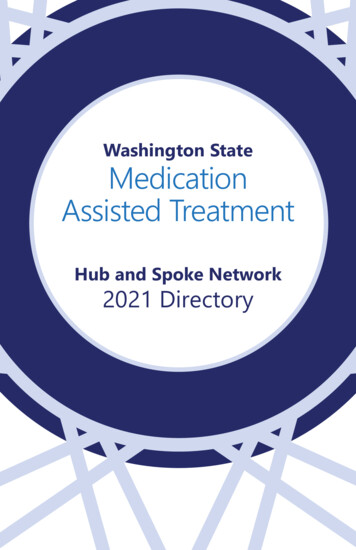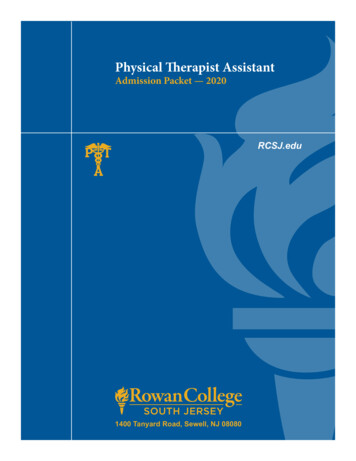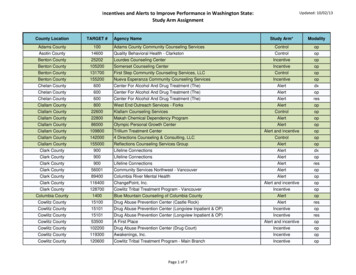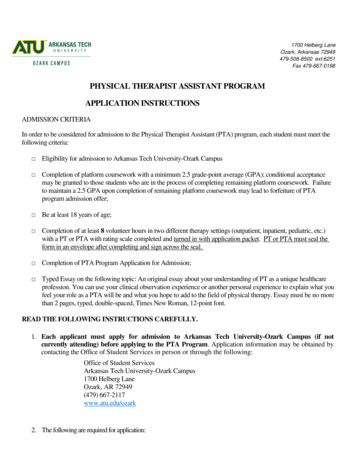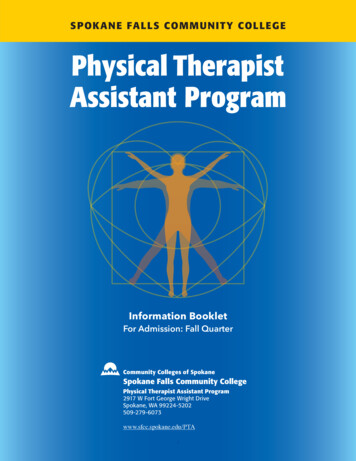
Transcription
S POKA NE FALLS CO MMUN ITY CO LLE GEPhysical TherapistAssistant ProgramInformation BookletFor Admission: Fall QuarterCommunity Colleges of SpokaneSpokane Falls Community CollegePhysical Therapist Assistant Program2917 W Fort George Wright DriveSpokane, WA 99224-5202509-279-6073www.sfcc.spokane.edu/PTA1
PHYSICAL THERAPIST ASSISTANTAssociate in Applied Science DegreePROGRAM INFORMATIONPhysical therapy means the assessment, evaluation, treatment and prevention of physicaldisability, movement dysfunction, and pain resulting from injury, disease, disability, or otherhealth related conditions. Physical therapist assistants work under the supervision of a physicaltherapist in the delivery of physical therapy services. Their duties include assisting the physicaltherapist in implementing treatment programs according to the plan of care, training patientsin exercises and activities of daily living, conducting treatments, using special equipment,administering modalities and other treatment procedures, and reporting to the physical therapiston the patient’s responses.Physical therapy practitioners work with the entire spectrum of the patient population and areemployed in a wide variety of settings including: hospitals and medical centers, rehabilitationcenters, pediatric facilities or school systems, private physical therapy clinics, home health careagencies, convalescent centers and extended care facilities.Spokane Falls Community College offers a two-year associate in applied science (A.A.S.)degree program to prepare physical therapist assistants for immediate employment. Theprogram includes study in anatomy and physiology, social science, technical physical therapycourses, and clinical education in area health care facilities.Spokane Falls Community College is accredited by the Commission on Colleges of the Northwest Association of Schools and Colleges. The PTA program is accredited by the Commissionon Accreditation in Physical Therapy Education of the American Physical Therapy Association.WHEN CAN NEW STUDENTS ENROLL?The next physical therapist assistant program (PTA) courses begin Fall Quarter. Admission intothe program is limited and requires a special application process. Please be aware that theadmission process is competitive. The completion of all requirements does not ensure admissioninto the program. The program is designed to be completed in seven full-time academicquarters. PTA courses must be taken in sequence and are only offered to students acceptedinto the PTA program. Students are encouraged to complete general education requirementsand related coursework prior to entering the PTA program or during the summer quarterbetween the first and second year of the program.WHERE CAN I GET MY QUESTIONS ANSWERED?Contact: Marie Cole, Program Director at Marie.Cole@sfcc.spokane.eduor Loren Pemberton, Academic Advisor at Loren.Pemberton@sfcc.spokane.edu.The deadline for submitting all application materials for fall quarter is foundin the Physical Therapist Assistant Program Application Booklet online:http://www.sfcc.spokane.edu/PTA2
PROGRAM INFORMATIONThe PTA faculty organizes the materials for admission but does not select students. It is the PTAAdvisory Committee that evaluates the applicants and determines eligibility for the program.Qualified applicants will be rated by points given for grades earned in prior coursework, mathand writing competence, and demonstration of previous experience in physical therapy orrelated medical fields. The top students will be invited for an interview. The interview ismandatory for acceptance into the program.Applicants will be notified of their status (accepted, alternate, or not qualified) by the Officeof Business, Professional Studies and Workforce Education no later than 30 days after theAdvisory Committee meets. Applicants who are accepted into the PTA program and then withdrawor decline acceptance are not given priority consideration in future classes.If English is your second language, a total TOEFL Score of 74 is required after acceptance intothe program (acceptable scores: reading 16, listening 18, speaking 22, and writing 18 for atotal of 74.) Please contact the program for more information.ADDITIONAL STUDENT FEES/SPECIAL REQUIREMENTSIn addition to the usual tuition and fees charged at SFCC, the PTA student will be responsiblefor some additional costs. Estimated costs: Required PTA textbooksBased on approximate costs of textbooks for PTA technicalcourses 1,810 Name badgeIncluded in lab fee Liability insuranceIncluded in lab fee Injury Insurance 41 per quarter through college or student may haveprivate insurance APTA student membershipIncluded in lab fees CPR /BLS Certification 50 15 textbook (estimate)Students to complete prior to admittance at their own expense.(American Heart Association Basic Life Support–BLS.) ImmunizationsCurrent TB test, flu shot, and proof of immunity to tetanus/diphtheria, measles, mumps, rubella, hepatitis B,and chickenpox Lab FeesApproximately 1,200/year National Background Check 90 through a credentialing agency Immunization Review 35 through a credentialing agencyInformation on financial aid is available in the Financial Aid Office.3
ADMISSION PREREQUISITES/REQUIREMENTS A.A.S. Degree: SFCCAdmission Prerequisites/Requirements:Apply for Admission to SFCC.Completion of the Physical Therapist Assistant Program Application Booklet available at the SFCC CounselingCenter, Building 30, Second Floor or online at www.spokanefalls.edu/PTABiology 241 Anatomy & Physiology is the only prerequisite to enter the program. Minimum grade of 2.0 required.Biology 160 is recommended but not required for Biology 241. Please contact Loren Pemberton in order towaive Biology 160 — 509-533-3503 or Building 30, Counseling.Completion of or eligibility for Math 92, 94, or 96, and Engl &101 (The Math Placement test must be taken todetermine eligibility.) These courses are graduation requirements.Preference given to students who have completed Math 92, 94, or 96, Engl &101, and Psyc&100 or Abnormal Psychology.Preference is given for documentation/verification of either paid or volunteer experience in a physical therapy setting(minimum of 40 hours recommended). Preferably in more than one setting to promote understanding of the breadthof the profession.Applications are accepted at the end of winter quarter for entry into the program the following Fall.If accepted, the student will be informed of documentation needed for currentimmunizations, CPR and First Aid training, and Washington State and National criminal background check.1. The PTA program incorporates a selective process for admission. This admission process uses a pointsystem based on relevant coursework completed at the time of application and verification of paid orvolunteer experience in a physical therapy setting. Please be aware that the completion of all prerequisitesdoes not ensure admission to the program.2. It is strongly recommended that students take the other general education requirements prior to enteringthe program. These include Psyc&100 or Abnormal Psychology, Math 94 or equivalent Algebra II, andEngl&101 or equivalent English composition.3. Courses are primarily offered on site during the day.CLINICAL EDUCATION REQUIREMENTSBecause the PTA program requires each student to complete approximately 568 hoursof clinical education in clinic facilities, there are several special requirements:1. Students are required to have access to reliable transportation. Clinic sites will be locatedthroughout the greater Spokane area and perhaps beyond. Students may also be requiredto be on campus the same day. Bus service will not accommodate transportation needs, andcar pools are rarely feasible, as it is unusual for more than one student to be assigned to a site.2. Students are required to have medical insurance during the quarters that they are in clinics.Medical insurance is available through the college although any private health insurance is acceptable.3. Students are also required to have malpractice/liability insurance. This is paid for by lab fees on aquarterly basis for approximately 10.4. May require mandatory drug testing at students own expense.5. Healthcare workers are required to have current TB tests, immunizations and CPR training. These arenecessary prior to entering the program and will be explained in detail at the student orientation.6. The PTA Program complies with the “Child/Adult Abuse Information Act,”RCW 43.43.830 through 43.43.840. Each PTA student is required to participate inan investigation for criminal history information prior to entry into the program.7. Dress and grooming will be appropriate for professional settings.8. Spring quarter of the second year involves full-time clinical affiliations. Students will pay tuitionand receive training in clinical sites 40 hours per week. It is nearly impossible to work at a paid jobduring this time. Please plan ahead for this financial consideration.4
ESSENTIAL FUNCTIONS FOR SUCCESS FOR THE PTA PROGRAMThe following information is provided to assist you in achieving a better understanding of thesensory, physical, communication, cognitive, behavioral, social and professional skills necessaryto successfully work as a PTA. These criteria are identified as being essential functions forsuccess for physical therapist assistants and as such, closely match the abilities needed tosuccessfully complete the clinical and laboratory components of the PTA program at SFCC.Students must be able to meet these minimum standards throughout the program, with orwithout reasonable accommodation, for successful completion of the program requirements.It is the policy of Spokane Falls Community College to provide reasonable accommodation toqualified students with disability so that they can meet these required standards. If you aredisabled and need some special accommodations, please contact the program supervisor ofdisability support services program at 533-4166.1. SENSORY/PHYSICAL SKILLS The student must be able to:1. Provide general and emergency treatment to patients, including CPR.2. Execute actions which require strength and coordination of both gross and fine motor movements,balance and functional use of the senses of touch and vision.3. Observe and interpret patient movement, non-verbal communication, skin condition includingchanges in appearance or color, anatomical structure, etc.4. Read and interpret equipment dials, graphs, patient charts, professional literature, and notes fromphysicians and other professionals.5. Lift, carry, and push adult and pediatric patients safely. Lift, carry and push heavy equipment andwheelchairs utilizing proper body mechanics, avoiding injury to self or patient/classmate.6. Lift and carry up to 30 pounds frequently, lift up to 50 pounds occasionally, and greater than50 pounds seldom.7. Manipulate equipment including bolsters, pillows, plinths, mats, assistive devices, to aid inpositioning, moving or treating a patient effectively.8. Respond to a patient calling from behind a curtain, warning calls from anyone (patient, staff, etc.),bells, alarms/signals.2. COMMUNICATION The student must be able to:1. Provide patients with clear instructions that are adapted to their cognitive levelsand communication needs.2. Communicate effectively, compassionately and respectfully with patients and their families, includingperception of non-verbal communication.3. Document clear and legible progress notes in patient charts, written home programsand instruction to patients and family members.4. Interact respectfully and effectively with many professionals including members of a multidisciplinaryteam and convey essential information for safe and effective care.5. Deliver clear oral presentations to classmates and health care professionals.(continued on next page)5
3. COGNITIVE DEMANDS The student must be able to:1. Concentrate and attend to detail amidst a variety of environmental distractions.2. Prioritize multiple tasks and carry out complex sequence of instructions.3. Read, measure, calculate, reason, and analyze information from a variety of sources accurately,thoroughly and quickly.4. Use problem-solving skills to promote safety and to transfer learning from one situation toanother and make appropriate decisions in a timely manner.5. Interact effectively and appropriately with patients of various ages, behaviors, cognitive abilities,cultures and ethnic backgrounds.4. BEHAVIOR, SOCIAL AND PROFESSIONAL SKILLS The student must be able to:1. Effectively adapt to frequent changes in work environment and patient/client population.2. Tolerate emotionally stressful workloads effectively.3. Comply with legal and ethical standards set forth by the APTA Standards of Ethical Conductfor the PTA, The Guide to Physical Therapist Practice, Value Based Behaviors for the PTA,and the laws of Washington State regarding physical therapy.4. Adapt treatment styles to effectively work with a variety of different supervisors.5. Possess emotional stability in order to provide safe and effective care.6. Acknowledge and respect individual values, beliefs and opinions to successfully foster harmoniousworking relationships with fellow students, patients and other professionals.7. Self evaluate capabilities, needs and performance.8. Maintain personal appearance and hygiene appropriate to classroom and clinic settings.DOES THE PROGRAM TRANSFERTO A BACCALAUREATE INSTITUTION?The technical courses for the physical therapist assistant program are notdesigned to transfer to four-year institutions. Students who are planning to earna master’s or doctorate degree in physical therapy should consult with an adviserfrom the four-year institution to plan an appropriate selection of classes to ensurethat all requirements are met.EMPLOYMENT OUTLOOKRegionally and nationally, job placement of graduates of physical therapistassistant programs is excellent. The PTA profession is rated by the United StatesDepartment of Labor Bureau of Labor Statistics as one of the fastest growingprofessions, and current projections indicate that this trend will continue. Graduates of SFCC’s PTA program can expect to be hired immediately, though relocation may be necessary. There are many job opportunities for both men andwomen, and career opportunities for pursuit of specialty interests in rehabilitation,orthopedics, geriatrics and pediatrics. Starting salaries vary in range dependingon demand and usually include benefits. Complete information on practice actsand regulations can be obtained from state licensing boards.6
PTA PROGRAM GRADING POLICYGrades are reported to your permanent transcript as a numerical grade to the nearest tenthaccording to the following table. A numerical grade of less than 2.0 is a 44.03.93.8A-939290-913.73.63.5B 6C 7977-7875-762.52.42.37472-7370-712.22.12.0CZ GRADE:The ‘Z’ grade is “an instructor initiated option to withdraw a student from a class after the officialwithdraw date has passed”. A ‘Z’ grade is not given for non-attendance or to anyone who has notcompleted all of the course work to date.INCOMPLETE GRADE:If your performance in a course has been generally satisfactory with the exception of 1 or 2 assignments or skill checks, you may be able to arrange for an Incomplete Grade Student Contract withthe instructor. The student or instructor may initiate the request for an incomplete grade. Incomplete grades are given solely at the instructor’s discretion and under specific conditions that mustbe met to change an incomplete to a permanent grade. An incomplete grade in any course of theprogram is equivalent to being placed on probation. If the Student Contract is not completed asagreed, the student may be dismissed from the program. A copy of an Incomplete Grade StudentContract can be found in the PTA handbook Appendix.7
COURSE SEQUENCE — First YearPrerequisite:FALLBiol&241Human Anatomy & Physiology 15 creditsPTA 101Introduction to Physical Therapy3 creditsPTA 106Regional Human Anatomy & Physiology5 creditsPTA 102PTA 110PTA 170WINTER1 creditPTA Procedures I: Basic PT Procedures Seminar3 creditsPTA Procedures I: Basic PT Procedures Lab4 creditsTOTAL: 16 creditsPTA 103Applied Anatomy Seminar3 creditsPTA 104Survey of Pathophysiology5 creditsPTA 173PTA 105PTA 107SPRINGPhysical Therapy TerminologyApplied Anatomy Lab3 creditsIntroduction to NeurosciencePhysical Therapy Documentation4 credits1 creditTOTAL: 16 CreditsPTA 111PTA Procedures II: PT Modalities SeminarPTA 112PTA Procedures III: Functional Restoration Seminar 3 creditsPTA 171PTA 172PTA 1513 creditsPTA Procedures II: PT Modalities Lab4 creditsPTA Procedures III: Functional Restoration LabClinical Experience I4 credits1 creditTOTAL: 15 creditsSUMMER(It is possible to do this the summer between the 1st and 2nd year,however, preference is given to students who complete this before entry.)5 credits5 credits5 creditsTOTAL: 15 creditsCOURSE SEQUENCE — Second YearFALLPTA 202Introduction to OrthopedicsPTA 270PTA Procedures IV: Therapeutic Exercise LabPTA 210PTA 212PTA 272PTA 251PTA 2543 creditsPTA Procedures IV: Therapeutic Exercise Seminar3 creditsPTA Procedures VI: Pediatric Rehab Seminar1 creditsPTA Procedures VI: Pediatric Rehab LabClinical Experience IIClinical Seminar II4 credits2 credits1 credit1 creditTOTAL: 15 credits8
WINTERPTA 201Issues in Physical Therapy2 creditsPTA 211PTA Procedures V: Rehab Applications Seminar3 creditsPTA 203PTA 271PTA 252PTA 255Physical Therapy Preparatory LabPTA Procedures V: Rehab Applications LabClinical Experience IIIClinical Seminar IIIPTA 2534 credits3 credits1 creditSPRING1 creditsTOTAL: 14 creditsClinical Affiliation12 creditsTOTAL: 12 creditsPROGRAM TOTAL (required for AAS): 103 credits1 Must have been taken within the last five years and completed with a 2.0 grade or better. Coursework older than five years will be evaluated on a case-by-casebasis. Even though BIOL& 160 is not a prerequisite for BIOL& 241 for PTA students, it is recommended. You must contact Loren Pemberton in the counselingcenter at (509) 533-3503 (Loren.Pemberton@spokanefalls.edu) in order to waive BIOL& 160 as a prerequisite for BIOL& 241.2 Admission preference is given to students who complete these courses prior to entry into the program. May be substituted with approval of program chair.Credits may be taken during summer between first and second year. Credits from these courses are included in the total credits for degree.3 Abnormal Psychology may be substituted for PSYC& 100 General Psychology.4 MATH 092 or MATH 096 may be substituted for MATH 094. Placement test is needed to determine eligibility if a college level math has not been taken.Disclaimer: The college cannot guarantee courses will be offered in the quarters indicated. During the period this guide is in circulation, there may be curriculumrevisions and program changes. Students are responsible for consulting the appropriate academic unit or adviser for more current and specific information. theinformation in this guide is subject to change and does not constitute an agreement between the college and the student.COURSE DESCRIPTIONSPTA 101 Introduction to Physical TherapyPTA 104 Survey of Pathophysiology(3.0 credits) This course is an introduction to the practiceof physical therapy emphasizing the role of the physicaltherapist assistant as a member of the health care team.Investigation of the law pertaining to the practice ofphysical therapy and ethical conduct. Issues of teamwork,interpersonal communication skills and patient motivationwill be explored.Prerequisite: Acceptance into the PTA program.(5.0 credits) This course includes a basic overview ofdisease processes including general pathologicalresponses and the physiology of healing and repair. Adescription of specific diseases and conditions, and themedical and surgical forms of treatment as they relate torehabilitation is covered and there is discussion ofsystemic origins of musculoskeletal pain.Prerequisite: Grade of 2.0 or better in previous PTA courses.PTA 102PTA 105 Introduction to NeurosciencePhysical Therapy Terminology(4.0 credits) An introduction to the structures and basicfunctions of the nervous systems in relationship tophysical therapy treatment of patients with neurologicaldiagnoses is offered in this course.Prerequisite: Grade of 2.0 or better in PTA courses.(1.0 credits) This course is a supervised self-study ofterminology and abbreviations used to describe theanatomy, physiology, and pathology of the body systemsused in relationship to the practice of physical therapy.Terms associated with diagnostics, surgery, laboratorytests, pharmacology, and patient care are included.Prerequisite: Acceptance into the PTA program.PTA 106 Regional Human Anatomy andPhysiology (5.0 credits)Human body structure and function with emphasis on theskeletal, muscular, and nervous systems; the respiratoryand cardiovascular systems and introduction of digestiveand endocrine systems. Prerequisite: BIOL&241PTA 103 Applied Anatomy Seminar(3.0 credits) Instruction in human anatomy with anemphasis on the musculoskeletal system. Musculoskeletalstructures are explained in their relationship to function.Basic principles of kinesiology (the study of the body inmotion) will be presented. The principles of joint range ofmotion and manual muscle testing will be taught. Respiration and its neuromuscular process will be provided.Prerequisite: Grade of 2.0 or better in previous PTA courses.Course Descriptions (continued on next page)9
PTA 107 Physical Therapy DocumentationPTA 171 PTA Procedures II: PT Modalities Lab(1.0 credit) Instructional focus on physical therapydocumentation that follows guidelines and specificdocumentation formats required by state practice acts,pratice settings and other regulatory agencies. Billing andpayment information will also be discussed.Prerequisite: Acceptance into the PTA program.(4.0 credits) Laboratory course focusing on the application of deep heat modalities, electrotherapy and basicmassage techniques. Laboratory sessions include thefundamentals of traction and other physical agents usedin physical therapy with an emphasis on communication,utilization and safety in all applications.Prerequisite: Grade of 2.0 or better in previous PTA courses.PTA 110 Procedures I : Basic PTProcedures Seminar (3.0 credits)PTA 172 PTA Procedures III: FunctionalRestoration Lab (4.0 credits)Basic introduction to patient care skills includingbody mechanics, preparation for different patientdiagnoses and treatment environments. Basic conceptsand components of aseptic and infection controlt e c h n i q u e s , w o u n d c a re , e d e m a m a n a g e m e n t ,compression bandaging and taping will be explored.Methodology of data collection including vital signs andanthropometric measurements is presented. An introduction to modalities including superficial heat, cold,light therapy, diathermy and hydrotherapy as it pertainsto patient care will be taught.Prerequisite: Grade of 2 .0 or better in previous PTA courses.Instruction in physical restoration techniques includingbed mobility, patient transfers, postural analysis,principles of normal and abnormal ambulation, balance,use of assistive devices, and selected functional rehabilitation activities.Prerequisite: Grade of 2.0 or better in previous PTAcourses.PTA 173 Applied Anatomy Lab (3.0 credits)Laboratory course focusing on human anatomy with anemphasis on the musculoskeletal system and functionalmovement. External palpation and identification ofstructures is explained and their relationship tofunction. Application of basic principles of kinesiology(the study of the body in motion) will be presented.Data collection and assessment pertaining to joint rangeof motion, manual muscle testing, and respiration will betaught.Prerequisite: Grade of 2.0 or better in previous PTA courses.PTA 111 PTA Procedures II :PT Modalities Seminar (3.0 credits)Theory and principles of deep heat modalities, electrotherapy, postural drainage, basic massage, and introduction to fundamentals of traction and other physicalagents used in physical therapy.Prerequisite: Grade of 2.0 or better in previous PTA courses.PTA 112 PTA Procedures III :Functional Restoration SeminarPTA 201 Issues in Physical Therapyand Health Care (2.0 credits)(3.0 credits) Instructional focus on functional restorationtechniques for neurologic, orthopedic and other patientsrequiring physical therapy; including bed mobility, patienttransfers, use of assistive devices, orthotics, andprosthetics, wheelchair positioning, and postural analysis.Issues pertaining to the principles of normal andabnormal gait, Americans with Disability Act pertaining toenvironmental accessibility and community serviceopportunities will be explored.Prerequisite: Grade of 2.0 or better in previous PTA courses.This course is a survey of medical, legal, and psychosocialissues relating to the role of the physical therapist assistant invarious physical therapy facilities and in the delivery ofhealth care. Emphasis on the goals of physical therapyand how the PTA can influence the achievement of thosegoals.Prerequisite: Grade of 2.0 or better in PTA courses orpermission of instructor.PTA 202 Introduction to Orthopedics(3.0 credits) This course is the basic introductionto biomechanics and mechanisms of orthopedic injuriesand diseases. Fundamentals of orthopedic terminologyare addressed, and a survey of surgical repair withemphasis on rehabilitation is included.Prerequisite: Grade of 2.0 or better in PTA courses orpermission of instructor.PTA 151 Clinical Experience 1 (1.0 credits)Supervised clinical observation and experience in avariety of physical therapy clinic settings affiliated with thecollege are provided. A clinical discussion group focuseson interpersonal communication and patient interaction,oral and written patient progress reports, and effectiveproblem solving skills.Prerequisite: Grade of 2.0 or better in PTA courses.PTA 203 Physical Therapy Preparatory Lab(1.0 credits) Instructional focus is on general pharmacological concepts for the physical therapist assistant,preparation for the physical therapist assistant (PTA)licensing exam, special tests and evidence basedstandardized tools for assessment of the patient inphysical therapy.Prerequisite: Grade of 2.0 or better in previous PTA courses.PTA 170 PTA Procedures I: Basic PTProcedures Lab (4.0 credits)Experiential learning of basic patient care skills includingvital signs, bandaging, aseptic techniques, wound careand edema management, and athletic taping. Preparationof patient and treatment environment in a laboratorysetting. Application of superficial heat, cold, light therapy,diathermy and hydrotherapy.Prerequisite: Acceptance into the PTA program.10
settings or a physical therapy departments associatedwith the college. This affiliation is sufficient to insure thatthe student has reached the minimum level of competency required for an entry-level physical therapistassistant in the application of physical therapy proceduresand the understanding of clinical responsibilities andsupervisory relationships prior to graduation.Grading option: Pass/fail.Prerequisite: Grade of 2.0 or better in PTA courses.PTA 210 PTA Procedures IV: TherapeuticExercise Seminar (3.0 credits)Instructional focus on physical therapy conceptsfor therapeutic exercise techniques as they relateto treatment of the spine, extremities, cardiovascular,pulmonary, and vestibular systems. Discussion of stagesof healing, post-operative indications and contraindications will be explored. Common exercise programs,protocols, equipment and exercise strategies will also beexamined. Patient motivational issues and the PTA role asa member of the healthcare team will also be incorporated.Prerequisite: Grade of 2.0 or better in previous PTA courses.PTA 254 Clinical Seminar II (1.0 credit)Clinical lecture and discussion seminar will focus oncultural competence and verbal and written communication with clients and the health care team.Prerequisite: Grade of 2.0 or better in previous PTA courses.PTA 211 PTA Procedures V: RehabApplications Seminar (3.0 credits)PTA 255 Clinical Seminar III (1.0 credit)Instructional focus on physical therapy concepts forspecific neurologic disabilities including spinal cordinjuries, stroke, head injuries, MS and other neurologicdiseases. Normal and abnormal aging processesincluding Parkinson’s, Alzheimer’s, pulmonary andbalance related disorders will be explored. Investigationof appropriate data collection methods and treatmentsfor orthopedic patients including upper and lowerextremity dysfunctions; injuries to the spine; and lowerextremity amputations according to the Guide to PhysicalTherapist Practice. Issues pertaining to physical therapymanagement of the burn patient, functional assessmentsand testing for sensory-related deficits is discussed.Prerequisite: Grade of 2.0 or better in previous PTA courses.Survey of issues surrounding patient care and teamwork.Topics will focus on patient interaction, adjustment todisability and grief, ethics, and physical therapist andphysical therapist assistant roles and responsibilities.Prerequisite: Grade of 2.0 or better in previous PTA courses.PTA 270 PTA Procedures IV: TherapeuticExercise Lab (4.0 credits)Laboratory course focus on development of therapeuticexercise programs for prevention and treatment ofdysfunction of the spine, extremities, cardiovascularsystem, vestibular system, and somatosensory system.Implementation of treatment protocols and exercisetechniques for specific diagnoses and conditionsincluding orthopedic and neurological. Assessmenttechniques for posture, strength, flexibility, cardiovascularfitness will be employed. Documentation of treatment,response to treatment, assessment and plann
into the program. The program is designed to be completed in seven full-time academic quarters. PTA courses must be taken in sequence and are only offered to students accepted into the PTA program. Students are encouraged to complete general education requirements and related coursework prior to entering the PTA program or during the summer quarter
